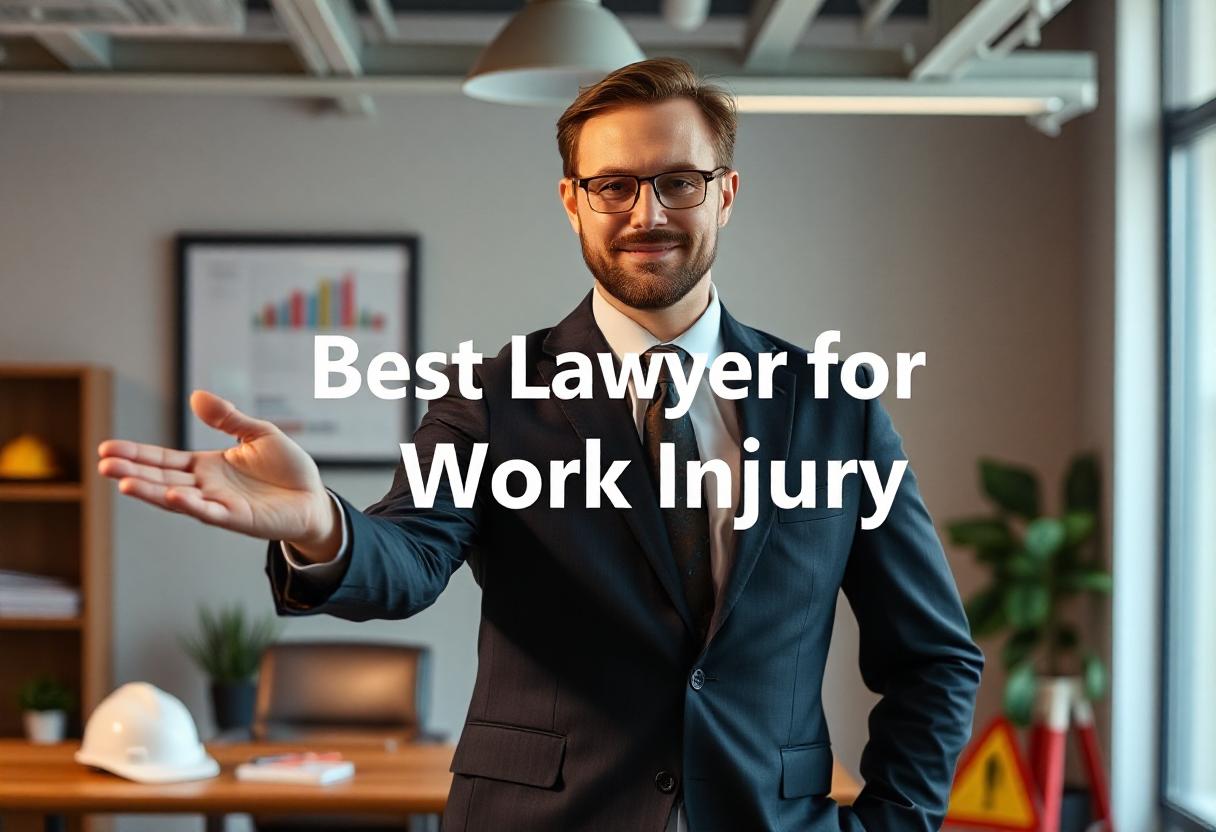If you’ve been injured at work and are seeking legal representation, finding the best lawyer to handle your case is crucial. With so many attorneys out there, it’s important to know what to look for to ensure you’re getting the best possible representation. This ultimate guide will walk you through the process of finding the perfect lawyer for your work injury case.
Whether you’ve suffered from a slip and fall, repetitive motion injury, or something more serious, hiring the right attorney can make all the difference in the success of your claim. From experience and expertise in personal injury law to a track record of winning settlements for their clients, there are several factors to consider when searching for the best lawyer to handle your work injury case.
In this guide, we’ll explore the qualities to look for in a lawyer, questions to ask during the initial consultation, and tips for evaluating potential attorneys. By following these steps, you’ll be well-equipped to find the best lawyer for your work injury case and ensure you receive the compensation you deserve.
Importance of hiring a lawyer for a work injury case
When you suffer an injury at your workplace, it can be a stressful and overwhelming experience. Not only are you dealing with the physical and emotional toll of the injury, but you also have to navigate the complex legal system to ensure you receive the compensation you deserve. This is where hiring a skilled work injury lawyer becomes crucial.
A work injury lawyer is an expert in personal injury law and understands the intricacies of the workers’ compensation system. They can help you navigate the claims process, gather the necessary evidence, and negotiate with insurance companies to get you the maximum settlement possible. Without the guidance of a lawyer, you may find yourself at a significant disadvantage, as insurance companies often have teams of attorneys dedicated to minimizing payouts and protecting their own interests.
Moreover, work injury cases can be complex, with various legal nuances and technicalities that the average person may not be aware of. A skilled lawyer can identify and address these complexities, ensuring that your case is handled properly and that you receive the full benefits and compensation you are entitled to. They can also help you understand your rights, the timeline of the claims process, and the potential outcomes, allowing you to make informed decisions throughout the legal proceedings.
Understanding the different types of work injury cases
Work-related injuries can take many forms, and it’s essential to understand the different types of cases that a work injury lawyer can handle. Some of the most common types of work injury cases include:
- Slip and fall accidents: These occur when an employee slips or trips and falls on a hazardous surface or object in the workplace, leading to injuries such as fractures, sprains, or head trauma.
- Repetitive motion injuries: These are injuries that develop over time due to repetitive tasks or movements, such as carpal tunnel syndrome, tendinitis, or bursitis.
- Machinery or equipment-related accidents: These involve injuries caused by malfunctioning or improperly used machinery, tools, or equipment in the workplace.
- Exposure to toxic substances or environments: Employees may suffer from illnesses or conditions due to exposure to hazardous materials, chemicals, or environments in the workplace.
- Vehicle-related accidents: If an employee is injured in a car or truck accident while performing work-related duties, they may be eligible for workers’ compensation benefits.
- Occupational diseases: Certain illnesses, such as respiratory conditions or cancer, can be directly linked to the nature of an employee’s work.
Regardless of the type of work injury, a skilled lawyer can help you navigate the claims process and ensure that you receive the compensation you are entitled to under the law. They can also help you understand the potential long-term implications of your injury and advocate for your best interests throughout the legal proceedings.
The qualities to look for in a work injury lawyer
When searching for the best lawyer to handle your work injury case, there are several key qualities you should look for to ensure you’re getting the right representation:
- Expertise in personal injury and workers’ compensation law: The lawyer you choose should have a deep understanding of personal injury law, as well as specific expertise in workers’ compensation cases. They should be well-versed in the relevant state and federal laws and regulations that govern these types of cases.
- Proven track record of success: Look for a lawyer with a demonstrated history of winning settlements and awards for their clients in work injury cases. This can be evidenced by their case results, client testimonials, and professional accolades.
- Strong communication and negotiation skills: Your lawyer should be an effective communicator who can clearly explain the legal process, your rights, and the potential outcomes of your case. They should also be skilled negotiators who can advocate for your best interests and secure the maximum possible settlement.
- Personalized attention and responsiveness: A good work injury lawyer should provide you with personalized attention and be responsive to your questions and concerns throughout the legal process. They should be accessible and keep you informed every step of the way.
- Resources and support: The lawyer you choose should have access to the necessary resources, such as medical experts, investigators, and other specialists, to build a strong case on your behalf. They should also have a team of support staff to ensure your case is handled efficiently.
- Compassion and empathy: Dealing with a work injury can be a difficult and emotional experience. Your lawyer should demonstrate genuine compassion and empathy for your situation, and be committed to advocating for your best interests.
By keeping these qualities in mind, you can increase your chances of finding the best lawyer to handle your work injury case and ensure that you receive the compensation and support you deserve.
Researching and shortlisting potential lawyers
Once you’ve determined the importance of hiring a work injury lawyer and understand the different types of cases they can handle, the next step is to start researching and shortlisting potential candidates. This process can be daunting, but with the right approach, you can find the perfect lawyer for your case.
Begin by asking for referrals from trusted sources, such as your employer, coworkers, or other personal injury attorneys. Word-of-mouth recommendations can be invaluable in identifying reputable lawyers with a proven track record of success. You can also search online directories, such as those provided by your state bar association or legal directories like Martindale.com, to find lawyers in your local area who specialize in work injury cases.
As you research potential lawyers, pay attention to their experience, areas of expertise, and client reviews. Look for lawyers who have a significant amount of experience handling work injury cases similar to yours, as well as a history of successful settlements and awards. Additionally, review the lawyer’s website and any online profiles to get a sense of their approach, communication style, and commitment to their clients.
Once you’ve compiled a list of potential lawyers, it’s time to narrow down your options. Start by contacting each lawyer’s office and inquiring about their availability, fees, and the process for scheduling an initial consultation. This will help you get a sense of their responsiveness and customer service, which are important factors in choosing the right lawyer.
After gathering this information, create a shortlist of the top 3-5 lawyers that you’d like to meet with for an initial consultation. This will give you the opportunity to assess their qualifications, communication style, and overall fit for your case in person.
Initial consultation with potential lawyers
The initial consultation with a potential work injury lawyer is a crucial step in the process of finding the best representation for your case. This meeting allows you to get a firsthand impression of the lawyer’s expertise, communication style, and overall approach to handling your case.
When scheduling the consultation, be sure to ask about any fees or costs associated with the meeting. Many reputable work injury lawyers offer free initial consultations, so you can get a sense of their services without incurring any upfront costs.
During the consultation, come prepared with a list of questions and information about your work injury case. Be ready to provide details about the incident, the nature and extent of your injuries, and any medical treatment you’ve received. This will help the lawyer better assess the merits of your case and provide you with an accurate assessment of your legal options.
Some key things to pay attention to during the initial consultation include:
- The lawyer’s level of engagement and attentiveness: Does the lawyer actively listen to your concerns and ask relevant follow-up questions, or do they seem distracted or uninterested?
- The lawyer’s communication style: Can the lawyer explain complex legal concepts in a way that you can easily understand, or do they use jargon-heavy language?
- The lawyer’s confidence and demeanor: Does the lawyer appear confident in their abilities and the potential outcome of your case, or do they seem uncertain or hesitant?
- The lawyer’s responsiveness to your questions: Does the lawyer take the time to thoroughly address your questions and concerns, or do they rush through the consultation?
By paying close attention to these factors, you can get a better sense of whether the lawyer is the right fit for your work injury case and whether they have the necessary expertise and resources to provide you with the best possible representation.
Questions to ask during the consultation
During the initial consultation with a potential work injury lawyer, it’s important to ask the right questions to assess their qualifications, experience, and approach to handling your case. Here are some key questions to consider:
- How long have you been practicing personal injury and workers’ compensation law?
- What percentage of your practice is dedicated to work injury cases?
- Can you provide examples of similar work injury cases you’ve handled and the outcomes you achieved?
- What is your strategy for building a strong case and securing the maximum possible settlement?
- How will you communicate with me throughout the legal process, and how often can I expect updates?
- What are the potential challenges or obstacles I may face in my case, and how will you address them?
- What is your fee structure, and how are your legal fees calculated?
- Do you have the necessary resources, such as medical experts and investigators, to support my case?
- How long do you estimate the legal process will take, and what are the potential timelines?
- Are there any specific steps I should take to support my case, such as keeping a detailed record of my injuries and expenses?
By asking these questions, you can gain a better understanding of the lawyer’s expertise, approach, and commitment to your case. This information will be crucial in helping you make an informed decision about which lawyer to hire.
Evaluating the lawyer’s experience and track record
Once you’ve completed the initial consultations with your shortlisted work injury lawyers, it’s time to evaluate their experience and track record in more detail. This will help you determine which lawyer is the best fit for your case and has the highest likelihood of securing a favorable outcome.
Start by reviewing the lawyer’s educational background and professional credentials. Look for attorneys who have graduated from reputable law schools and have been admitted to practice law in your state. Additionally, consider any specialized certifications or designations they may hold, such as a Board Certification in Workers’ Compensation Law.
Next, examine the lawyer’s experience handling work injury cases. Ask for specific details on the types of cases they’ve handled, the industries they’ve represented, and the outcomes they’ve achieved. Look for lawyers with a proven track record of winning settlements and awards for their clients, as this demonstrates their ability to navigate the complex legal system and negotiate effectively with insurance companies.
It’s also important to consider the lawyer’s reputation within the legal community. Check for any professional accolades, such as being named a “Super Lawyer” or “Best Lawyer in America,” as these designations can be indicative of the lawyer’s skill and expertise. Additionally, review any client testimonials or online reviews to get a sense of the lawyer’s communication style, responsiveness, and overall level of service.
Finally, assess the lawyer’s resources and support team. A well-established law firm with a team of experienced attorneys, paralegals, and support staff can provide you with the resources and attention you need to build a strong case. Additionally, consider the firm’s access to medical experts, investigators, and other specialists who can contribute to the success of your case.
By thoroughly evaluating the lawyer’s experience, track record, and available resources, you can make an informed decision about which attorney is the best fit for your work injury case.
Discussing the lawyer’s fees and payment structure
One of the most important considerations when choosing a work injury lawyer is their fee structure and payment plan. This can have a significant impact on the overall outcome of your case, so it’s crucial to understand the lawyer’s fees and how they will be calculated.
Most work injury lawyers operate on a contingency fee basis, which means they only get paid if they win your case. This fee is typically a percentage of the total settlement or award you receive, usually ranging from 25% to 40%. It’s important to discuss this fee structure upfront and ensure that you understand exactly how much the lawyer will be taking from your final settlement.
In addition to the contingency fee, there may be other expenses associated with your case, such as court filing fees, expert witness fees, or the cost of obtaining medical records. Your lawyer should be transparent about these additional costs and explain how they will be billed to you. Some lawyers may require you to pay these expenses upfront, while others may deduct them from your final settlement.
It’s also important to understand the lawyer’s payment structure and how they will handle the disbursement of your settlement funds. Some lawyers may require you to pay a retainer fee upfront, while others may not require any payment until the case is resolved. Additionally, you should discuss how the lawyer will distribute the settlement funds, including any outstanding medical bills or liens that need to be paid.
When discussing the lawyer’s fees and payment structure, be sure to ask for a written fee agreement that outlines all the terms and conditions. This will help ensure that there are no misunderstandings or surprises down the line. Additionally, don’t be afraid to negotiate the fee structure if you feel it’s not fair or reasonable.
By thoroughly understanding the lawyer’s fees and payment structure, you can make an informed decision about which attorney is the best fit for your work injury case and ensure that you receive the maximum possible compensation.
Making the final decision and hiring the best lawyer
After completing the initial consultations, evaluating the lawyers’ experience and track records, and discussing their fees and payment structures, it’s time to make the final decision and hire the best lawyer for your work injury case.
When making your decision, consider all the factors you’ve evaluated and weigh them against your specific needs and goals for the case. Think about which lawyer you felt most comfortable with, who demonstrated the strongest understanding of your case, and who you believe has the best chance of securing a favorable outcome.
It’s also important to trust your instincts. If one lawyer stood out as the clear frontrunner, or if you felt a stronger connection with a particular attorney, that can be a valuable factor in your decision-making process. Remember, you’ll be working closely with this lawyer throughout the legal proceedings, so it’s crucial that you feel confident in their abilities and that you can trust them to handle your case with the utmost care and professionalism.
Once you’ve made your decision, be sure to formally hire the lawyer by signing a retainer agreement or contract. This document will outline the terms of your engagement, including the lawyer’s fees, the scope of their representation, and any other relevant details. Review this agreement carefully and don’t hesitate to ask questions or negotiate any terms you’re not comfortable with.
After hiring your work injury lawyer, be sure to stay in close communication throughout the legal process. Provide them with any new information or documentation related to your case, and be responsive to their requests for information or assistance. By working closely with your lawyer and providing them with the support they need, you can increase the chances of a successful outcome and ensure that you receive the compensation you deserve.
Remember, the decision to hire a work injury lawyer is a crucial one, and it’s important to take the time to find the right fit for your case. By following the steps outlined in this guide, you can be confident that you’ve found the best possible representation to advocate for your rights and secure the justice you deserve.
Conclusion: The importance of professional legal representation for work injury cases
In conclusion, finding the best lawyer to handle your work injury case is essential for ensuring that you receive the compensation and benefits you are entitled to. With the right legal representation, you can navigate the complex workers’ compensation system, gather the necessary evidence, and negotiate with insurance companies to secure the maximum possible settlement.
By understanding the different types of work injury cases, researching and shortlisting potential lawyers, and thoroughly evaluating their experience, track record, and fee structure, you can make an informed decision and hire the best attorney for your specific needs. Remember, the initial consultation is a crucial step in this process, as it allows you to assess the lawyer’s communication style, responsiveness, and overall fit for your case.
Ultimately, the decision to hire a work injury lawyer is a personal one, and it’s important to trust your instincts and choose the attorney who you believe will provide the best possible representation. By doing so, you can focus on your physical and emotional recovery, knowing that your legal interests are in capable hands.
Don’t hesitate to reach out to multiple lawyers and compare their qualifications and approach before making your final decision. With the right legal representation, you can increase your chances of a successful outcome and ensure that you receive the compensation and justice you deserve.





